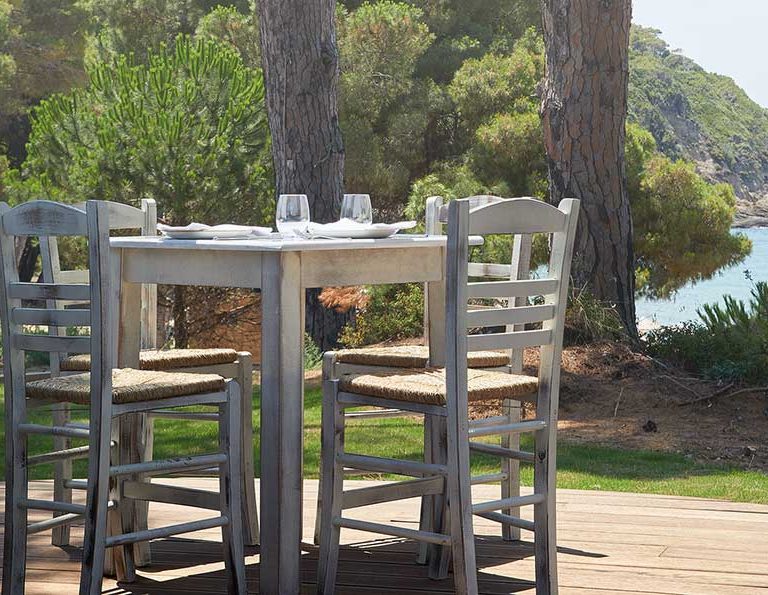
Some places in Greece feel almost inevitable in their beauty, as if nature itself conspired to make them
timeless. The southwestern tip of Skiathos is one such place—where emerald forests tumble into golden
sands, and the sea stretches out in every imaginable shade of blue.
The Greek National Tourism Organization saw the potential of this land in the 1960s, a time when
Greece was beginning to reimagine itself as a modern travel destination. They launched the Xenia hotel
project, a bold experiment in design that was meant to combine cutting-edge architecture with untouched natural beauty.
Among these hotels was Xenia Skiathos, designed by G. Nikoletopoulos and completed in 1963. It was
not simply a hotel; it was a statement of intent, a place where Greek modernism met Aegean tradition.
Its balconies overlooked a pristine coastline, and for a time, it was the meeting place for discerning
travellers.
But places change, and Xenia did too. Over the decades, it lost its status. A shifting tourism market,
changing expectations of luxury, and economic turbulence meant that what was once a vision of the
future became a relic of the past. Eventually, it ground to a halt, left to fade into quiet disrepair.
Then, in 2013, the Nathanailidou family stepped in.
A New Vision for a Fading Icon
When the family acquired the Xenia property through a government auction, they weren’t simply buying
land—they were inheriting a legacy. To restore Xenia was to do more than renovate a building; it was to
breathe life back into a dream that had been paused for too long.
They approached it with both reverence and ambition. The clean lines, open spaces, and integration
with the landscape that made Xenia an architectural landmark were preserved, not erased. At the same
time, they redefined what luxury means today.
Sustainability was woven into the new design—solar collectors, geothermal air conditioning, and a deep
respect for the land itself. Contemporary Greek art filled the spaces, echoing the creativity of the era
that had birthed Xenia in the first place. The result was something new but familiar, modern but deeply
rooted in its past. Elivi Skiathos was not a replica of Xenia. It was its future.
A Place That Holds Onto Time
There is something remarkable about standing on the same ground where history unfolded, where the
essence of a place has remained even as the structure around it has evolved.
The old Xenia had lost its prestige, that is no secret. But to rebuild and refine a new Xenia is to revitalise
it, and that can only bring a future to a past.
This is a story about architecture, restoration, and legacy, but also about time itself. The original Xenia
hotels were built in an era of optimism, a belief in modernity and progress. Elivi exists in a different
space, one that looks both forward and backward. The question is: how does that shift feel?
The Loyal Travellers Who Return
The true measure of success isn’t just in how a place looks, but in who comes back.
Many travellers who once stayed at the original Xenia now return to Elivi Skiathos. They bring their
children, even grandchildren, and talk of how the original beauty is still there, now carried under a new,
more refined banner.
I met one such couple. They had honeymooned at the old Xenia decades ago, and now, standing in the
revitalised Elivi, something stirred inside them. The views, the air, the very sense of place, it was all
familiar but different, changed yet unchanged.
For them, and many others, Elivi is a continuation of memory, proof that places do not have to be frozen
in time to be meaningful.

A Dialogue Between Past and Present
The dining venues honour this too. Xenia Restaurant, named for the past, focuses on traditional Greek dishes, allowing guests to taste flavours that have defined this land for generations. Leda & the Swan takes a more modern approach, blending Mediterranean influences into something contemporary yet unmistakably Greek.
The architecture speaks in muted tones, earthy textures, and open spaces that refuse to compete with the landscape. Rooms are understated yet elegant, with terraces that invite the outside in. The public spaces feel alive with contemporary Greek art, a reminder that tradition and evolution are not opposing forces, but two sides of the same story.
Even the Nest Greek Fish Restaurant, just steps from the sea, feels like a bridge between old and new—a
place where fresh seafood, caught the way it has been for centuries, meets the refined simplicity of
modern Greek hospitality.
Legacy. Reimagined

The Xenia hotels were built to introduce the world to Greece, to create places where natural beauty and
architecture coexisted in perfect harmony.
That legacy remains at Elivi Skiathos. It exists in the way the terraces catch the morning light, in the way the landscape has been allowed to breathe, rather than be overrun. It exists in the travellers who return, drawn by something they can’t quite explain but deeply understand.
To stay here is to step into that story, to walk through its pages and feel the weight of its history. It is a place where architecture, memory, and reinvention converge, proving that some places never truly fade—they just wait for the right moment to be seen again.
To submit a release, contact us here.


